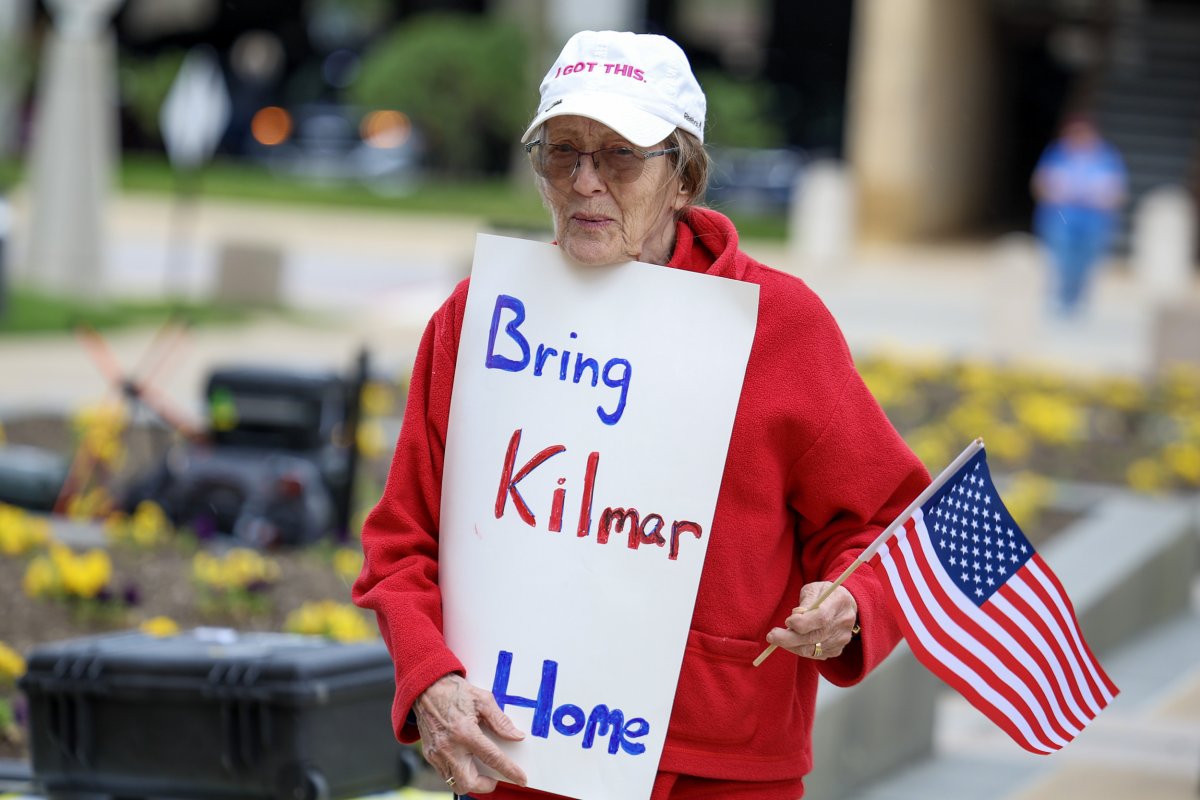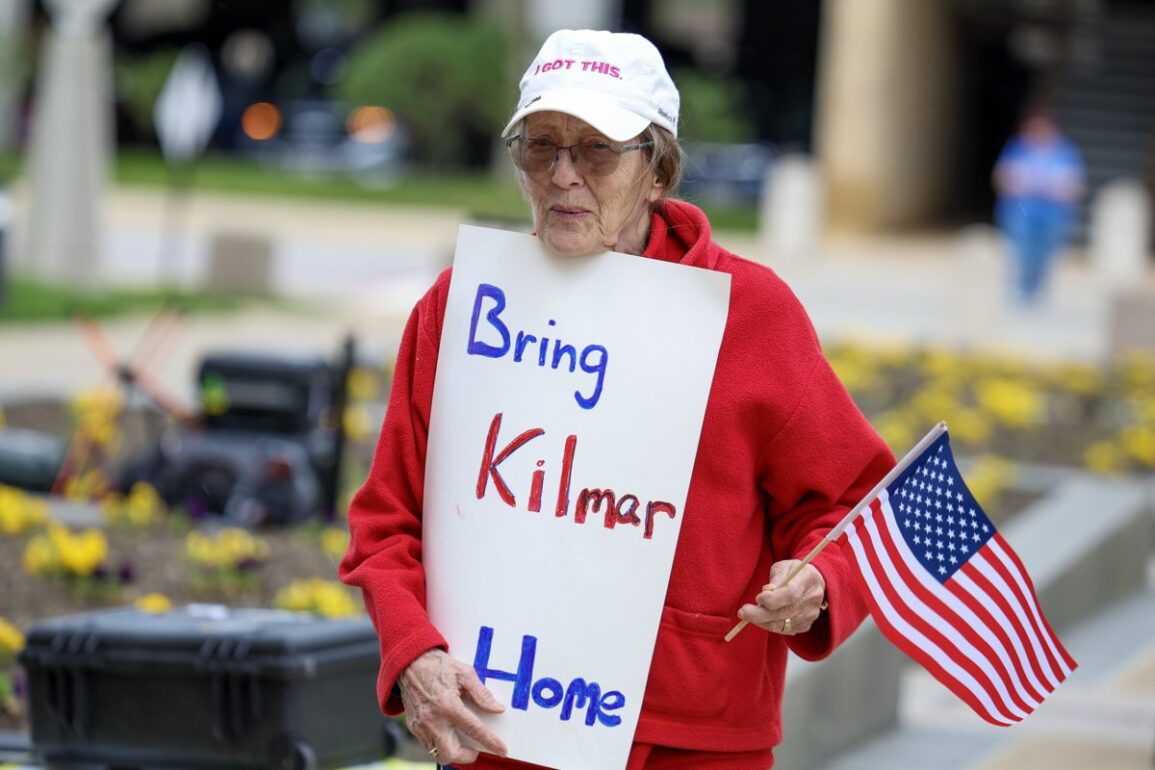On March 14, President Donald Trump hosted Salvadoran President Nayib Bukele, the self-proclaimed “world’s coolest dictator,” at the White House for a mutual admiration fest of grotesque proportions.
The Trump administration has made a show of deporting detained immigrants from the United States to El Salvador’s so-called “Terrorism Confinement Center”—Bukele’s brutal mega-prison, which confines inmates in horrific conditions for de facto life sentences.
Many of these migrants’ only crime has been to sport a tattoo. But the Trump administration has attempted to wash their hands of the matter by saying they’re in Salvadoran custody.

Protesters show support for Jennifer Vasquez Sura, the wife of Kilmar Abrego Garcia, who was mistakenly deported to El Salvador, outside Federal Court on April 15, 2025, in Greenbelt, Md.
Tasos Katopodis/Getty Images
One of those detainees is Kilmar Abrego Garcia, a Salvadoran immigrant and Maryland father of three children with special needs. Garcia hasn’t been charged or convicted of a crime in either the United States or El Salvador. An immigration judge had previously barred Garcia from deportation for fear of his persecution in El Salvador.
In a blatant disregard for due process and a unanimous ruling of the U.S. Supreme Court ordering the Trump administration to “facilitate” Garcia’s release, the two presidents each refused to lift a finger—despite Trump officials’ own admission that Garcia’s deportation was an “administrative error.”
With the illegal deportation of Garcia and several other immigrants (including U.S. permanent residents) snatched from universities, Trump is weaponizing his extreme take on national security to repress civil liberties at home. By arguing that Garcia is a “terrorist” (as Bukele called him in the White House meeting), despite clear evidence that Garcia is innocent, the two presidents are expressing their extreme disregard of the law, let alone human decency.
People should make no mistake about who Bukele is. We’ve carried out research in El Salvador since 2009, and we’ve followed Bukele for years as he’s hollowed out El Salvador’s hard-won democracy under the guise of fighting crime.
Eight of us from research and faith groups joined a delegation to El Salvador in October 2023, where human rights workers and families of people rounded up in mass arrests shared evidence about the tens of thousands of innocent people who had been swept up into Bukele’s prisons.
One human group, Socorro Juridico, estimates that at least 26,000 of the over 80,000 that Bukele has sent to his prisons are innocent of gang membership or any other crime. This includes human rights defenders, civil society leaders, labor leaders, and opponents of the Bukele regime.
We learned about the deaths of over 300 people (a number now closer to 400) and about torture in jails where people are cut off from family, lawyers, and the outside world. The crown jewel of this system is the mega-prison that can hold up to 40,000 prisoners, the prison where the United States is now paying El Salvador to disappear Venezuelan and Salvadoran deportees.
It was chilling to learn on that trip how Bukele, elected in 2019, manipulated public fear of gangs to declare a series of month-long “states of exception” starting in March 2022 and that continue today. These effectively suspend fundamental civil liberties and due process, greatly facilitating mass arrests with indefinite detention.
Equally chilling over the past four months, Bukele has reversed his country’s greatest legislative achievement in a generation, the 2017 ban on mining to save the country’s rivers from the toxic gold mines that have destroyed rivers, spread disease, and increased violence in neighboring Honduras and Guatemala.
In legalizing mining after arresting five prominent water defenders at the forefront of that 2017 victory, Bukele may have reached too far. A network of faith, environmental, and youth organizations have risen in El Salvador and internationally to oppose the return of mining in this water-scarce country. Three of five Salvadorans in a recent poll opposed mining, signaling that Bukele’s popularity may be fading.
Yet in Washington, the lovefest between Trump and Bukele ramped up the danger to U.S. democracy. Trump administration officials are now openly talking about deporting U.S. citizens to El Salvador’s mega-prison. Trump himself told Bukele on camera, “Homegrowns are next. … You gotta build about five more places.”
With the Trump administration already disappearing student protestors, it’s all too easy to imagine him following Bukele’s path and sending critics and activists to rot in Bukele’s horrific mega-prison, alongside Kilmar Garcia and many other innocent migrants.
In this arrangement, we wouldn’t just be exporting detainees. We’d essentially be importing Bukele’s dictatorship, with its tightening grip over his judiciary, his legislature, and his country’s media.
Now is the time for the public here to start paying attention to El Salvador and for our elected officials to demand an end to such deportations and to bring Kilmar Garcia home.
Robin Broad is a research professor at the American University.
John Cavanagh is a senior advisor at the Institute for Policy Studies.
They are co-authors of the 2021 book The Water Defenders: How Ordinary People Saved a Country from Corporate Greed and the 2024 report El Salvador’s State of Deception.
The views expressed in this article are the writers’ own.
This post was originally published on this site be sure to check out more of their content.









